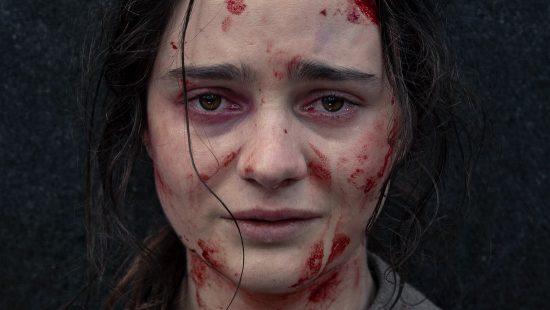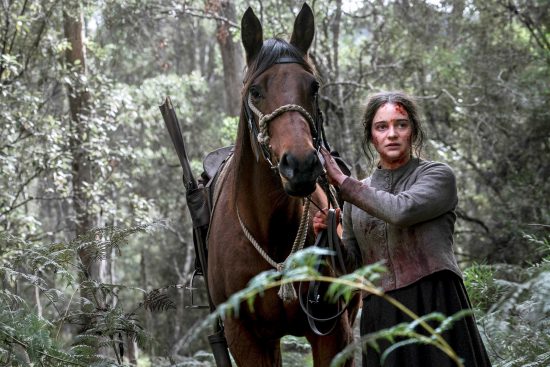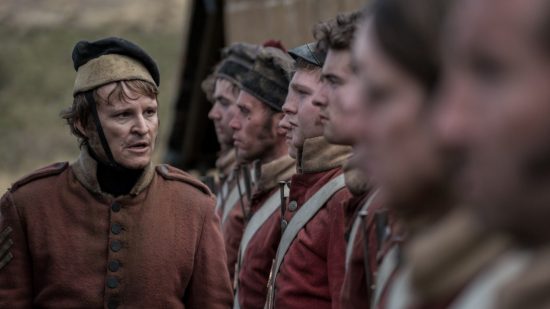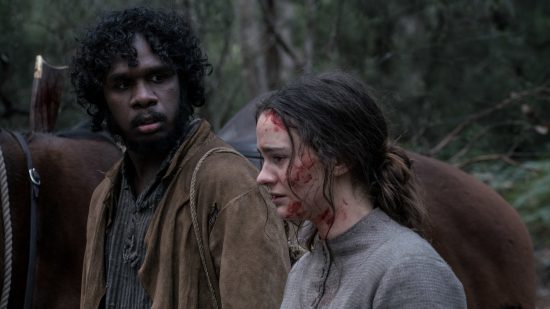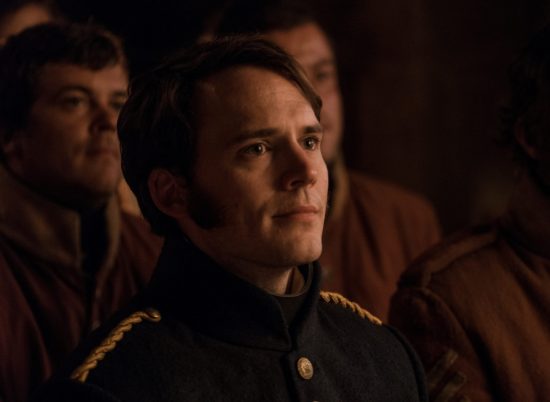Review: The Nightingale – “An urgent, uncompromising odyssey of self-discovery”
Australian actor-turned-director Jennifer Kent stunned critics and audiences alike with her 2014 debut, The Babadook. Equal parts terrifying and tragic, its meditative approach to trauma and grief has hung firmly in the memory since; a theme which carries over in her sophomore effort – albeit a film in which people are the true monsters lurking in the shadows.
You’ve probably heard about The Nightingale. The film prompted a plethora of walkouts during its festival run earlier this year, with many unable to stomach its unrelenting brutality. It’s both fair and true to attest that Kent’s follow-up is not for everyone – heck, even the steeliest of viewers will likely feel nauseous under the immense weight of its ferocity. But those brave enough to undertake this towering and essential feat of filmmaking will be rewarded with an urgent, uncompromising odyssey of self-discovery.
Some will likely pigeon-hole Kent’s latest as a “rape-revenge” flick. A pretty flimsy way of summarising what is a sprawlingly ambitious, socially complex period drama; highlighting the unspeakable horrors of colonisation in 1800s Tasmania in excruciating detail. We follow Clare (Aisling Franciosi) – an indentured Irish convict servant, in bondage to the merciless Lieutenant Hawkins (Sam Claflin). Overdue her ticket to leave, and wishing to start anew with her husband and baby, Hawkins relishes in his refusal to relinquish control.
This soon leads to a devastating, heartbreaking conflict which shatters Clare’s life into blood-sodden fragments. Not one to go down quietly, Clare defies the odds as she heads into the vast and unforgiving Outback in a bid to pursue Hawkins and his small party to Launceston – where the drunken Lieutenant is striving to land a major promotion. She enlists the aid of Billy (Baykali Ganambarr) – an Aboriginal tracker who too has a score to settle with the repressive English. Together the broken pair embark on a voyage of revenge and redemption, in which an unlikely alliance is formed.
At 136 minutes, this is very much a marathon; not a sprint. However, Kent sets the unyielding tone from the very first frame. Shot in boxy 1.375 “Academy” aspect ratio, and entirely lacking an orchestral score, The Nightingale is both technically and thematically suffocating. There is nothing to divert your attention away from the atrocities which unfold throughout its lengthy duration; Kent quite simply cages you in with the lions and lets them feast.
The first act, in particular, is extremely challenging – in fact, it’s probably the most uncomfortable, upsetting introduction to any film released in 2019. Once seen, you’ll understand why some festival-goers just couldn’t hack it. Because even fans of extreme cinema will likely flinch at the prolonged and repeated sequences of graphic rape and violence in the first 30 minutes; all captured with blistering realism and honesty. Never is the film gratuitous or exploitive though, rather historically accurate and entirely necessary for both character and plot. Yet the acts are undeniably alarming; leaving the viewer feeling wounded, dirty, and distressed.
The barbarity continues throughout as we enter the ruthless Australian Outback – a landscape rife with danger and demons; be that animals, insects, or worst of all, people. Just like the journey Clare and Billy undertake, you’ll be pulled through the bush and thorns; cut to ribbons by their steeliness, yet fulfilled by their unfailing sense of compassion. Because, for a film so heavily founded on savagery and sadism, The Nightingale is remarkably empathetic – using hurt as a healer. Our heroes emerge from the dirt as new spirits; scarred by their past, yet in charge of their future. Kent ensures there is a powerful, and indeed beautiful, poetry being told here.
Despite the bitterness of its vengeful subject matter, Kent continues to prove herself as an incredibly melodic auteur. The film is exceptionally crafted; punctuated with ethereal, primal cinematography, and astonishingly framed character shots. She has also elicited world-class performances from her central trio, with relative newcomer Franciosi delivering an absolute powerhouse of harrowing mastery. The trust shared between actor and filmmaker is both vital and sacred when making a project of this emotional intimacy and scale, and the evidence of their union shines impeccably throughout. The same can be said for both Ganambarr and Claflin – albeit in conflicting circumstances. Clare’s Aboriginal companion, Billy, manages to be both darkly humorous, and shatteringly poignant in equal measure. First-timer Ganambarr is particularly impressive in key moments which underpin the atrocious racism he and his fellow indigenous people suffer at the hands of the “white man”.
On the other hand, Kent unleashes the finest, most fearless performance of Claflin’s career. Frequently typecast as an everyday English nice guy, here he completely loses himself in a character which repeatedly pushes boundaries and comfort zones. Hawkins is unimaginably grotesque, and unthinkably evil, and Claflin entirely commits to his deviance. His accomplishment absolutely floored me.
The Nightingale seethes with anger; outlining the immoral and inexplicable injustice served to those caught within its tyrannical world. Yet there is a symphony of soul and spirit which pierces through the blackness – carving an unforgettable adventure of hard-earned hope and dignity. You don’t really watch Kent’s incredible second feature, rather survive it, but wear the bruises it leaves you with valour. This is astonishing, important, and downright unmissable cinema.
The Nightingale is out now in select cinemas and on-demand courtesy of Vertigo Releasing.

